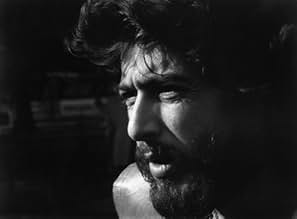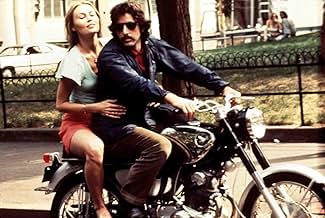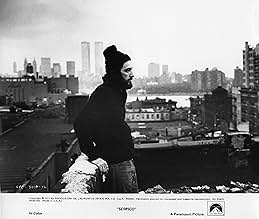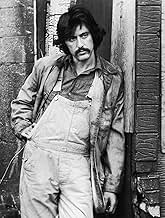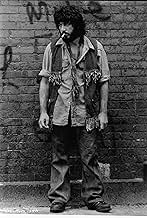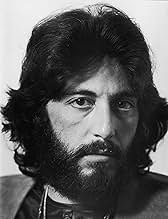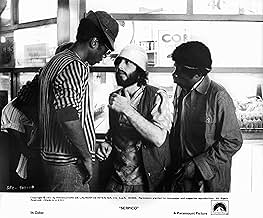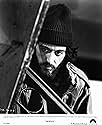Serpico
- 1973
- Tous publics
- 2h 10min
An honest New York cop named Frank Serpico blows the whistle on rampant corruption in the force only to have his comrades turn against him.An honest New York cop named Frank Serpico blows the whistle on rampant corruption in the force only to have his comrades turn against him.An honest New York cop named Frank Serpico blows the whistle on rampant corruption in the force only to have his comrades turn against him.
- Réalisation
- Scénario
- Casting principal
- Nommé pour 2 Oscars
- 8 victoires et 13 nominations au total
Barbara Eda-Young
- Laurie
- (as Barbara eda-Young)
Edward Grover
- Lombardo
- (as Ed Grover)
Albert Henderson
- Peluce
- (as Al Henderson)
Joseph Bova
- Potts
- (as Joe Bova)
Woodie King Jr.
- Larry
- (as Woodie King)
Avis à la une
Al Pacino is one of the best actors around, and he has many definitive roles. His role as Frank Serpico is certainly one of them. He acts with such charm and smoothness in some scenes, while explosive and intense in others.
The movie gets into a big plot line about police corruption and Serpico blowing the whistle on the department. It's interesting and the whole point of the movie, but the reason this is such a good movie is because of the character, not the plot. The better scenes include Serpico's personal life and struggles. There's one great part where he explains to his girlfriend why he's always wanted to be a cop. It's scenes like those that make you sympathetic for him.
Sidney Lumet and Pacino made a great team for this movie, and proved to be a great team for Dog Day Afternoon a few years later. But as good as a director Lumet is, as good as everyone involved with this movie is, this is Pacino's movie. It's an essential viewing for his fans.
My rating: 9/10
The movie gets into a big plot line about police corruption and Serpico blowing the whistle on the department. It's interesting and the whole point of the movie, but the reason this is such a good movie is because of the character, not the plot. The better scenes include Serpico's personal life and struggles. There's one great part where he explains to his girlfriend why he's always wanted to be a cop. It's scenes like those that make you sympathetic for him.
Sidney Lumet and Pacino made a great team for this movie, and proved to be a great team for Dog Day Afternoon a few years later. But as good as a director Lumet is, as good as everyone involved with this movie is, this is Pacino's movie. It's an essential viewing for his fans.
My rating: 9/10
A perfect, true to life film based on the true exploits of a young police officer named Frank Serpico. Serpico was an officer in a time when political corruption was rampant and many of his brethren were found "on the take." The true story is brought to the screen under the superb leadership and direction of Sidney Lumet and the brilliant performance of Al Pacino as Serpico. Serpico was said to be known for his eccentricity and Pacino plays it up every step of the way, from the hairy beard to the earrings; he immerses himself into the character. This is the first of two great pairings with Lumet and Pacino. They know character. You see it here and you see it in 'Dog Day Afternoon." They know the streets. Lumet is a avid filmmaker of "New York-style films." Pacino walks the beat in his hobo outfits and long hair as if he's a hippie, not a cop. Although an eccentric, Serpico cannot be bought and certainly cannot be had, by anyone... cop or crook Pacino was Oscar nominated, but lost to Jack Lemmon for his performance in "Save the Tiger." The film was also nominated for it's taut screenplay, based on the Peter Maas book of the same title.
9dtb
I'd been wanting to see SERPICO for some time; this real-life crime drama based on Peter Maas' nonfiction bestseller about an honest cop fighting corruption in the NYPD was one of the few grim-and-gritty New York crime dramas that my older brother didn't take me to see when I was a kid! :-) (I should explain that my brother, 9 years my senior, used to take me to the kind of movies he wanted to see -- films like TAXI DRIVER, REPORT TO THE COMMISSIONER, etc. Fortunately, I developed a taste for them as well, though our mother didn't think they were really appropriate for a girl as young as I was then. :-) No wonder this film helped young Al Pacino's then-rising star (he was fresh off THE GODFATHER when he began filming SERPICO) to soar to the stratosphere, complete with an Oscar nomination. Pacino's earnest intensity fuses Frank Serpico's disparate qualities into a spellbinding performance. The guy is a bundle of contradictions, the kind of man who could charm you, move you, and drive you crazy at the same time: a nice Catholic boy who can't commit to any of the devoted women in his life; an honest, downright rigid moralist who's also a free spirit known as "Paco" to his friends and lovers; and an undercover cop with detective aspirations whose hippie-like appearance rankled his superiors and fellow officers even as it helped him blend in on assignments. Pacino's riveting performance carries the film, with fine support by John Randolph, Tony Roberts, M. Emmet Walsh, Barbara eda-Young and Cornelia Sharpe, not to mention memorable uncredited turns by F. Murray Abraham, Judd Hirsch, Kenneth McMillan, and Tony LoBianco, among others. Sidney Lumet's taut direction of the script by Waldo Salt and Norman Wexler does Maas' source material proud, as well as taking advantage of evocative NYC locations (just try getting this kind of atmosphere in Canada, I dare you! :-). The sparing use of simple yet haunting music by Mikis Theodorakis sets the tone well. The end result: one of the best films of the 1970s and beyond. Rent the DVD to see some fascinating extras about the making of the film and the filmmakers' experiences with Frank Serpico himself, including interviews with Lumet and producer Martin Bregman (no Pacino, alas).
Frank Serpico begins his career with the NYPD as an idealistic rookie who believes in the moral value of policing. He has a simple and old-fashioned ethical code, an outlook which used to be known as honesty. What he finds is a moral sewer, five boroughs wide, in which almost every cop is on the take. The police are just another gang of hoodlums, but with more guns than the bad guys. Even basically decent cops go along with the kickback culture, because a locker-room psychology prevails in which values have become perverted. Squad loyalty is now a criminal conspiracy of silence. Detectives do not hesitate to shake-down hoods who are slow to pay. To Frank Serpico, this is simply wrong. He wants no part of it. And so his long agony begins.
Both responding to and helping to shape the mood of its time, a weary cynicism towards authority, "Serpico" arrived on the screen just as Watergate built to its climax. Americans could no longer regard their institutions as gleaming examples to mankind of optimism and good government. The film begins gloomily with Serpico badly wounded, having been shot in the face. We hear police and ambulance sirens fading, symbolically representing the life-force ebbing from Frank, and the withering of American dreams.
This first-class film is a triumph, and one that could easily have misfired. Had the crooked cops been depicted as mere thugs, then Serpico himself would have been an archetype, just another two-dimensional crusader. What gives the film its psychological richness is the realisation that the dishonest cops are NICE. These are affable, reasonable men who want to like Serpico and want to welcome him onto the team. The camaraderie is seductive and it's difficult for Frank to hold out against it. He is besieged by self-doubt, wondering if he is just a one-man awkward squad, or worse - a prima donna, sacrificing personal relationships on the altar of his own ego.
Again, the easy (but disastrous) course would have been to give Frank some big heroic speeches, allowing him to inveigh against corruption. The film chooses instead to go for psychological truth, and this is what makes the project outstanding. Appalled, afraid and despairing of ever changing anything, Frank withdraws into himself. He becomes the spectre at the feast, the silent rebuke, the muted but ever-present conscience of his colleagues.
Though Frank rejects the golden shield which is eventually offered, we feel that the system still means something. There are still some honest cops, and even after all these vicissitudes, the United States is still a nation of laws. Lumet's profoundly liberal and optimistic view of America ultimately shines through, but the final mood is one of quiet resignation rather than triumphalism. Right can prevail over wrong, but a price has to be paid. Serpico wins his titanic struggle, but he is diminished and saddened as a man.
The film contains some marvellous technical things. In the opening minutes, the action cuts between Frank as he is now (wounded, broken and alone) and as he started out (the clean-cut, idealistic rookie). These transitions are seamless, and the narrative logic is smooth and natural. We see Frank's first moment of disenchantment in a cafeteria when it dawns on him that cops get free handouts of food, but they have to take whatever comes. This first bewilderment develops until we see the gulf open up between Frank and the dishonest cops, the ones who take the money but also take the self-loathing.
The terrible stress to which Frank is subjected is depicted with skill. The police department has a huge institutional inclination to protect its own, and this vast weight is brought to bear on Serpico. Equally, the pressure is relieved cleverly at appropriate points in the narrative. Frank's 'collar' of Rudi Casaro reaches an explosive climax as this all too human guy reaches breaking-point. On the other hand, the romantic story-telling interlude with Laurie and Serpico's undercover cameo as an orthodox rabbi break the tension and vary the pace beautifully.
The second-unit work is of a uniformly high standard. We are shown atmospheric New York streetscapes with grubby brownstones and the massive, overbearing masonry of the Brooklyn Bridge, in knowing homage to the films noirs of twenty years earlier. The symbols are powerful. This city, and this police department, are too colossal for one man to stand against them. Practice sessions in the police firing gallery intelligently reinforce the film's undercurrent of foreboding. Paper targets obscure the gunmen's faces, suggesting a monolithic force united against Frank, then come hurtling towards him on pulleys, signifying the fate which is rushing to meet him.
Mikis (Zorba the Greek) Theodorakis has provided a classy score. I particularly liked the jazzy, minor-key horn passage.
Pacino puts in another of the towering performances which have distinguished him as the profoundest acting talent of his era. He is simply wonderful. Barbara Eda-Young gives top-notch support as Laurie, the genuinely loving partner who is destroyed by her man's seeming eagerness for martyrdom in rejection of domestic happiness. If ever an actor exuded confidence it's Tony Roberts, and he is ideally cast as Bob Blair, Serpico's well-connected ally. Though he can open City Hall doors, he can't actually help Frank at all. Nobody can. Christ-like, Frank understands that it is ordained - he must go to the hill alone.
Both responding to and helping to shape the mood of its time, a weary cynicism towards authority, "Serpico" arrived on the screen just as Watergate built to its climax. Americans could no longer regard their institutions as gleaming examples to mankind of optimism and good government. The film begins gloomily with Serpico badly wounded, having been shot in the face. We hear police and ambulance sirens fading, symbolically representing the life-force ebbing from Frank, and the withering of American dreams.
This first-class film is a triumph, and one that could easily have misfired. Had the crooked cops been depicted as mere thugs, then Serpico himself would have been an archetype, just another two-dimensional crusader. What gives the film its psychological richness is the realisation that the dishonest cops are NICE. These are affable, reasonable men who want to like Serpico and want to welcome him onto the team. The camaraderie is seductive and it's difficult for Frank to hold out against it. He is besieged by self-doubt, wondering if he is just a one-man awkward squad, or worse - a prima donna, sacrificing personal relationships on the altar of his own ego.
Again, the easy (but disastrous) course would have been to give Frank some big heroic speeches, allowing him to inveigh against corruption. The film chooses instead to go for psychological truth, and this is what makes the project outstanding. Appalled, afraid and despairing of ever changing anything, Frank withdraws into himself. He becomes the spectre at the feast, the silent rebuke, the muted but ever-present conscience of his colleagues.
Though Frank rejects the golden shield which is eventually offered, we feel that the system still means something. There are still some honest cops, and even after all these vicissitudes, the United States is still a nation of laws. Lumet's profoundly liberal and optimistic view of America ultimately shines through, but the final mood is one of quiet resignation rather than triumphalism. Right can prevail over wrong, but a price has to be paid. Serpico wins his titanic struggle, but he is diminished and saddened as a man.
The film contains some marvellous technical things. In the opening minutes, the action cuts between Frank as he is now (wounded, broken and alone) and as he started out (the clean-cut, idealistic rookie). These transitions are seamless, and the narrative logic is smooth and natural. We see Frank's first moment of disenchantment in a cafeteria when it dawns on him that cops get free handouts of food, but they have to take whatever comes. This first bewilderment develops until we see the gulf open up between Frank and the dishonest cops, the ones who take the money but also take the self-loathing.
The terrible stress to which Frank is subjected is depicted with skill. The police department has a huge institutional inclination to protect its own, and this vast weight is brought to bear on Serpico. Equally, the pressure is relieved cleverly at appropriate points in the narrative. Frank's 'collar' of Rudi Casaro reaches an explosive climax as this all too human guy reaches breaking-point. On the other hand, the romantic story-telling interlude with Laurie and Serpico's undercover cameo as an orthodox rabbi break the tension and vary the pace beautifully.
The second-unit work is of a uniformly high standard. We are shown atmospheric New York streetscapes with grubby brownstones and the massive, overbearing masonry of the Brooklyn Bridge, in knowing homage to the films noirs of twenty years earlier. The symbols are powerful. This city, and this police department, are too colossal for one man to stand against them. Practice sessions in the police firing gallery intelligently reinforce the film's undercurrent of foreboding. Paper targets obscure the gunmen's faces, suggesting a monolithic force united against Frank, then come hurtling towards him on pulleys, signifying the fate which is rushing to meet him.
Mikis (Zorba the Greek) Theodorakis has provided a classy score. I particularly liked the jazzy, minor-key horn passage.
Pacino puts in another of the towering performances which have distinguished him as the profoundest acting talent of his era. He is simply wonderful. Barbara Eda-Young gives top-notch support as Laurie, the genuinely loving partner who is destroyed by her man's seeming eagerness for martyrdom in rejection of domestic happiness. If ever an actor exuded confidence it's Tony Roberts, and he is ideally cast as Bob Blair, Serpico's well-connected ally. Though he can open City Hall doors, he can't actually help Frank at all. Nobody can. Christ-like, Frank understands that it is ordained - he must go to the hill alone.
The first real power-house performance by Pacino, thirty years down the line still one of his finest
Sidney Lumet proved himself to be a highly competent and effective director/storyteller for the true story of New York Officer Frank Serpico, who became famous after appearing to testify before the NAPA Commission about payoffs and corruption in the Police Department. At the time, it was unheard of, and it gained Peter Maars attention to write the book, which thus got transferred to the screen as so. But what makes Serpico such a riveting and eye catching picture today are the little things about it, little details in specific scenes and locations that help ring Serpico's emotions far more than true- it's just there. Even more amazing on the part of the actual filming of the movie is that it was at the time filmed backwards (started with the beard, then the mustache, then clean-shaven).
Al Pacino, right off of the first part of the Godfather trilogy, took this role with all the fire and compassion that he had in him. He sees in Serpico not just an honest cop wanting some balance and honor in his work, yet also a man, who can get as joyful and humorous as he can act subtle, furious, and thoughtful. This will always remain one of his stand-out roles after all the Scarfaces and Scent of a Woman pictures he can do because he, as well as Lumet, know how to approach such a saga. Plenty of great, compelling set pieces, and even sweet ones (like when he first buys the sheepdog as a puppy). A+
Al Pacino, right off of the first part of the Godfather trilogy, took this role with all the fire and compassion that he had in him. He sees in Serpico not just an honest cop wanting some balance and honor in his work, yet also a man, who can get as joyful and humorous as he can act subtle, furious, and thoughtful. This will always remain one of his stand-out roles after all the Scarfaces and Scent of a Woman pictures he can do because he, as well as Lumet, know how to approach such a saga. Plenty of great, compelling set pieces, and even sweet ones (like when he first buys the sheepdog as a puppy). A+
Le saviez-vous
- GaffesThe prison "chain gang" being led into the wagon at the beginning has male and female prisoners on the same "chain," and both sexes are transported in the same wagon. The NYPD absolutely forbade that then, and still does.
- Citations
Frank Serpico: The reality is that we do not wash our own laundry--it just gets dirtier.
- Versions alternativesThere is one Australian VHS version released through RCA Columbia Pictures Hoyts Home Video in the 1980s which had all profanity overdubbed with tamer language, as well as some scenes of sexuality/nudity. Subsequent releases on DVD are uncensored.
- ConnexionsEdited into The Kid Stays in the Picture (2002)
Meilleurs choix
Connectez-vous pour évaluer et suivre la liste de favoris afin de recevoir des recommandations personnalisées
- How long is Serpico?Alimenté par Alexa
Détails
- Date de sortie
- Pays d’origine
- Site officiel
- Langues
- Aussi connu sous le nom de
- Serpiko
- Lieux de tournage
- Lewisohn Stadium, Amsterdam Avenue, Manhattan, Ville de New York, New York, États-Unis(Meeting Scene with Bob Blair)
- Sociétés de production
- Voir plus de crédits d'entreprise sur IMDbPro
Box-office
- Budget
- 3 000 000 $US (estimé)
- Montant brut aux États-Unis et au Canada
- 29 800 000 $US
- Montant brut mondial
- 29 858 717 $US
Contribuer à cette page
Suggérer une modification ou ajouter du contenu manquant



